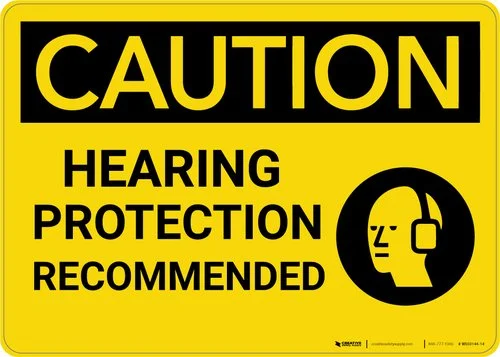The Effects of Noise
Excessive sound levels are responsible for more problems than hearing loss.
There’s a new definition of noise: Noise is unwanted and/or harmful sound.
The new definition replaces the obsolete definition - Noise is unwanted sound. The change was adopted by the International Commission on Biological Effects of Noise.
Noise can adversely affect efficiency, accuracy, equilibrium, stability, nerves, sleep, heart,
respiratory, and has been known to contribute to stress, anxiety, irritability, headaches, nausea,
fatigue, accidents, vertigo, vision, and tinnitus, leading eventually to permanent hearing loss.
Damage received from excessive noise can amplify the effects
of hearing loss caused by aging.
One loud noise exposure can cause lifelong
hearing loss, tinnitus, and hyperacusis.
The Hocks Noise Braker®, utilizing the Hocks Noise Filter®,
reduces harmful sound to non-damaging decibel levels.
D.H. - "Many years ago I worked at United Airlines and had form fitted earplugs made by Hocks. I am now retired but still wear them when I'm doing noisy woodworking and chainsaw work. I guess I could be a TV promo person for these earplugs! I still have great hearing, even after years of working in noisy environments. My regards, and I compliment your customer relations."
Pain
The threshold of pain for normal ears is approximately 120-140 dB.
Noise, at this volume and higher, causes the eardrum to stretch, causing pain. If the tissues in the middle ear or eardrum are inflamed, sounds of moderate intensity can also be painful.
Another type of aural discomfort occurs as a result of abnormal function in the cochlea. This condition, called auditory recruitment, creates an abnormal increase in loudness perception.
Persons who have this condition find sound levels of only moderate intensity to be quite uncomfortable.
Stress
The Franklin Institute Online has a list of different ways noise contributes to stress.
In the wild, loud noises serve as a warning sign. They can indicate that there is a predator near by or that you are in danger of falling rocks, or a falling tree. This invokes a stress response in animals as well as in humans.
As noise levels of normal every day life increase, so does the natural level of stress. This increase of noise related stress can affect the ability to learn, affect blood pressure, the immune system, and can contribute to the growth of ulcers.
Tinnitus
Tinnitus is the perception of sound in one or both ears when there is no external sound, and is often referred to as ringing in the ears. The ringing can be a soft background noise, or an overpowering noise that drowns out all other sounds. It can be occasional or constant, and usually accompanies hearing loss.
Tinnitus can be caused when loud noises damage the sensory hairs within the cochlea. The damage to the hairs can cause them to relay false data. Hearing loss occurs when the hairs relay little or no data. The false data is translated by the brain as ringing, buzzing, whistling, hissing, clicking, chirping, or pulsing sounds.
Balance Problems
Along with the cochlea, the inner ear includes the vestibular apparatus, the organ of balance.
Under noisy conditions, complaints of nystagmus (rapid involuntary side-to-side eye movements), vertigo (dizziness), and balance problems have been reported.
General Health Problems
Noise is a contributor to adverse health influences. Numerous conditions have been attributed to noise exposure, such as: nausea, headaches, insomnia, irritability, fatigue, loss of appetite and other ailments.

